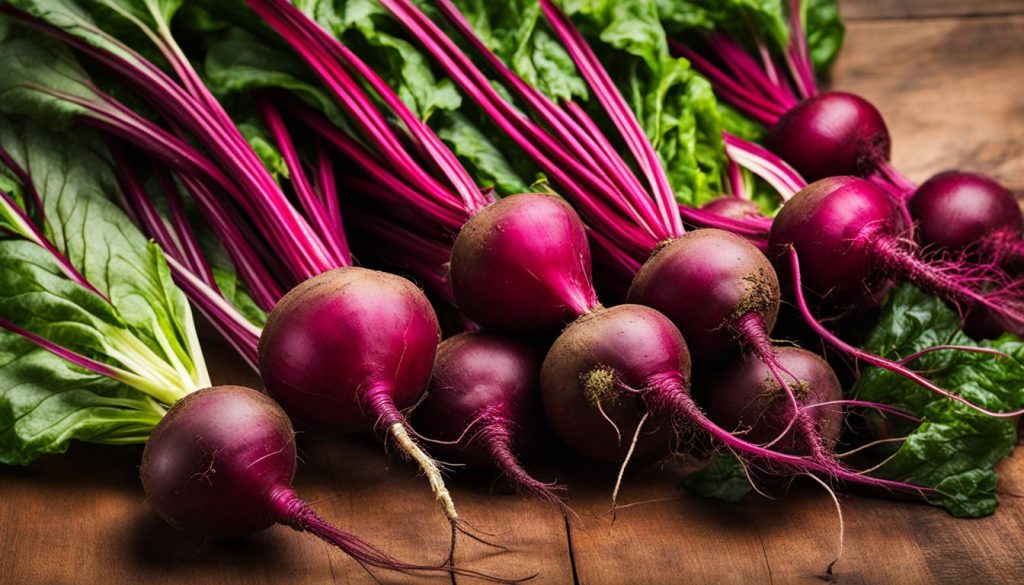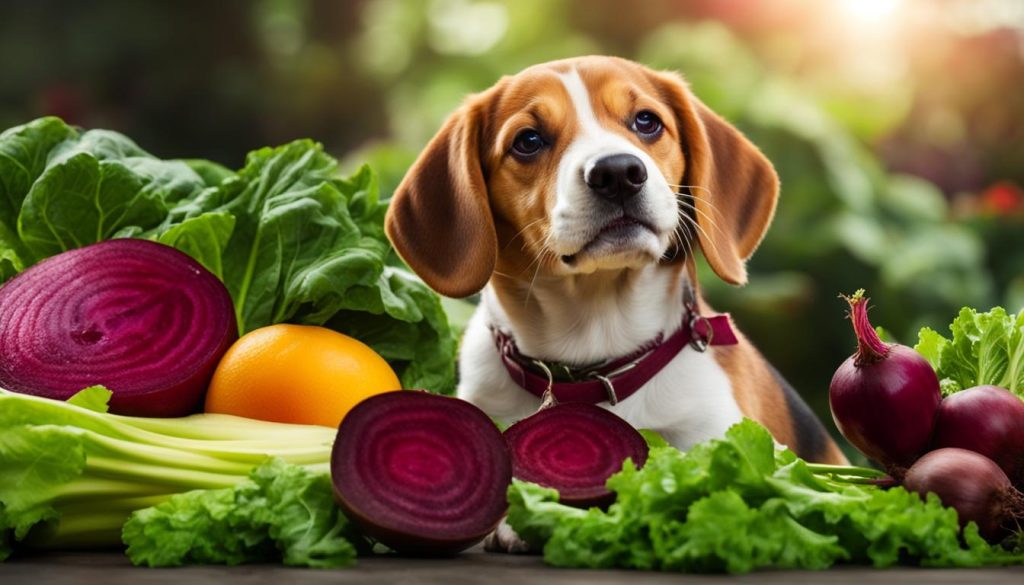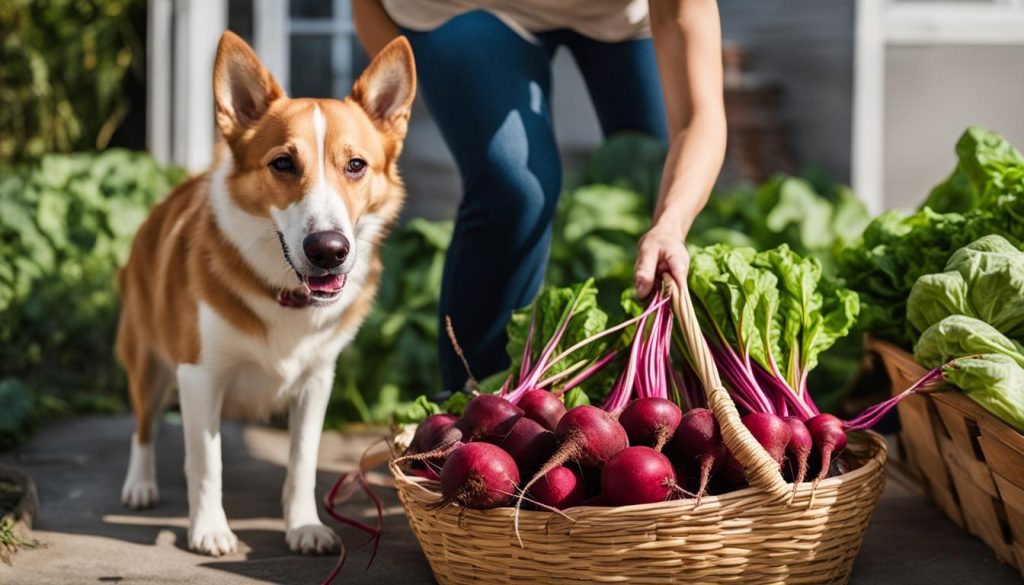As a pet owner, you may be wondering whether it’s safe to feed beets to your furry friend. Well, the good news is that beets can indeed be a healthy addition to your dog’s diet. Not only are they low in calories and fat, but they also pack a punch when it comes to nutrition.
Before we delve into the details of beet consumption for dogs, let’s explore the various health benefits that these vibrant vegetables bring to the table. From supporting digestion to promoting a healthy immune system, beets offer a range of advantages that can contribute to your dog’s well-being.
But like with any dietary change, moderation is key. It’s important to introduce beets gradually into your dog’s diet and consult with a veterinarian beforehand, especially if your dog has any existing kidney issues or sensitivities. Safety first, after all!
Key Takeaways:
- Beets can be safely consumed by dogs and provide various health benefits.
- They are low in calories and fat, but high in fiber, vitamins, and minerals.
- Beets can support digestion, boost the immune system, and promote healthy skin and coat.
- Moderation is important, and beets should be introduced gradually into a dog’s diet.
- Consult with a veterinarian before giving beets to dogs, especially if they have kidney issues or sensitivities.
The Nutritional Profile of Beets
Beets are not only vibrant and delicious but also packed with essential nutrients that can benefit dogs. They are a great source of fiber, which aids in digestion and helps maintain a healthy weight. Fiber also promotes regular bowel movements and can prevent constipation. Additionally, beets contain a variety of vitamins, including vitamin C, vitamin A, and folate.
Minerals are also abundant in beets, with potassium being one of the most notable. Potassium is crucial for maintaining healthy muscles and supporting normal heart function. Other minerals found in beets include manganese, which plays a role in bone health and metabolism, and iron, which is essential for oxygen transport throughout the body.
The nutritional profile of beets makes them a valuable addition to a dog’s diet. However, while beets offer many benefits, they should be given in moderation as part of a balanced diet. As always, consult with a veterinarian to ensure that beets are suitable for your dog and to determine the appropriate serving size.

Table: Nutritional Content of Beets*
| Nutrient | Amount per 100g |
|---|---|
| Calories | 43 |
| Carbohydrates | 9.6g |
| Fiber | 2.8g |
| Protein | 1.6g |
| Fat | 0.2g |
| Vitamin C | 4.9mg |
| Vitamin A | 33µg |
| Folate | 109µg |
| Potassium | 325mg |
| Manganese | 0.33mg |
| Iron | 0.79mg |
*Nutrient content may vary depending on the specific variety of beets and cooking methods.
Are Beets Safe for Dogs?
In general, beets are safe for dogs to eat. They are not toxic to canines. However, it is important to exercise moderation when feeding beets to dogs and to introduce them gradually into their diet. Before incorporating beets into your dog’s meals, it is advisable to consult with a veterinarian, particularly if your dog has any kidney issues or sensitivities. This will ensure that you are taking the necessary precautions and considering your dog’s specific needs.
When introducing beets to a dog’s diet, it is crucial to start with small amounts and observe any reactions or changes in their digestion. It is recommended to properly prepare beets by cooking or steaming them before feeding them to dogs. This helps to make them more digestible and reduces the risk of any digestive discomfort. By preparing beets in this way, you can provide your dog with the nutritional benefits of this vegetable while ensuring their safety and well-being.

Remember that every dog is different, and what works well for one may not work well for another. It is always best to consult with a veterinarian who can provide personalized advice based on your dog’s specific health and dietary requirements. With careful consideration and proper preparation, you can safely incorporate beets into your dog’s diet, providing them with the potential health benefits that this vegetable offers.
Health Benefits of Beets for Dogs
Beets offer various health benefits for dogs, making them a valuable addition to their diet. Here are some of the key benefits:
- Digestion support: Beets are rich in fiber, which promotes healthy digestion in dogs. The fiber content helps regulate bowel movements and prevents constipation.
- Immune system support: The high vitamin C content in beets can boost a dog’s immune system, helping to defend against diseases and infections.
- Healthy skin and coat: Beets contain essential nutrients like vitamin A, which is vital for maintaining healthy skin and a shiny coat in dogs.
- Antioxidant protection: Beets are a good source of antioxidants that help to neutralize harmful free radicals in a dog’s body, reducing the risk of chronic diseases.
- Heart health support: The nitrates present in beets can help lower blood pressure in dogs, promoting heart health and reducing the risk of cardiovascular problems.
- Anti-inflammatory properties: Beets contain betaine, a compound with anti-inflammatory properties that can help alleviate inflammation and pain in dogs, especially in cases of arthritis.
To incorporate the health benefits of beets into your dog’s diet, consult with your veterinarian to determine the appropriate portion size and preparation methods.

Nutritional Comparison: Beets vs. Carrots
| Nutrient | Beets (1 cup, diced) | Carrots (1 cup, sliced) |
|---|---|---|
| Calories | 58 | 52 |
| Fiber (g) | 3.8 | 3.6 |
| Vitamin A (IU) | 148 | 17,063 |
| Vitamin C (mg) | 6.7 | 7.6 |
| Potassium (mg) | 442 | 410 |
| Iron (mg) | 1.3 | 0.6 |
This table compares the nutritional content of beets and carrots. While beets are higher in calories and iron, carrots provide significantly more vitamin A. Both vegetables offer valuable nutrients for your dog’s well-being, and incorporating a variety of vegetables into their diet can provide a balanced nutritional profile.
Potential Risks and Considerations
While beets are generally safe for dogs, there are some potential risks and considerations to keep in mind when feeding them to your furry friend. It’s important to be aware of these factors to ensure the well-being and health of your canine companion.
Oxalate Content
One potential risk associated with beets is their oxalate content. Oxalates are naturally occurring compounds found in many plant-based foods, including beets. In some dogs, a diet high in oxalates may contribute to the formation of kidney stones. If your dog is prone to kidney issues or has a history of urinary stones, it’s essential to consult with a veterinarian before introducing beets into their diet.
Allergic Reactions
Like any food, some dogs may have allergies or sensitivities to beets. Signs of an allergic reaction can include itching, hives, swelling, or difficulty breathing. If you notice any of these symptoms after feeding your dog beets, discontinue their consumption and seek veterinary care immediately.
Beeturia
Beeturia is a harmless condition that occurs when a dog’s urine or feces turns red after consuming beets. It is caused by the betanin pigment present in beets and is not a cause for concern. However, if you notice a sudden change in your dog’s urine or feces color and you haven’t fed them beets, it’s advisable to consult with a veterinarian to rule out any underlying health issues.
Consultation with a Veterinarian
Prior to incorporating beets into your dog’s diet, it’s always a good idea to consult with a veterinarian. They can provide personalized advice based on your dog’s specific needs and health conditions. A veterinarian can help determine the appropriate quantity of beets to feed your dog and address any potential risks or concerns.

| Potential Risks and Considerations | Description |
|---|---|
| Oxalate Content | Beets contain oxalates, which can contribute to kidney stone formation in susceptible dogs. |
| Allergic Reactions | Some dogs may have allergies or sensitivities to beets, resulting in itching, hives, swelling, or difficulty breathing. |
| Beeturia | Beets can cause a harmless color change in a dog’s urine or feces, turning them red. |
| Consultation with a Veterinarian | It’s important to consult with a veterinarian before introducing beets into your dog’s diet to address any specific concerns or health conditions. |
Alternative Ways to Include Beets in Your Dog’s Diet
If you’re looking for alternative ways to feed beets to your dog, there are several options to consider. These alternatives can provide variety in your dog’s diet while still allowing them to enjoy the nutritional benefits of beets. Here are a few ideas:
Beet Puree
One way to incorporate beets into your dog’s meals is by making a beet puree. Simply cook the beets until they are tender, then blend them into a smooth puree. You can mix this puree with your dog’s regular food or use it as a topping to add some extra flavor and nutrients.
Beet Treats
Another option is to make homemade beet treats for your dog. You can find simple recipes online that involve baking or dehydrating beet slices to create crispy treats. These treats can be a great way to reward your dog while introducing them to the taste of beets.
Beet and Veggie Mix
If your dog enjoys vegetables, you can create a beet and veggie mix as a side dish or topping for their meals. Chop up a variety of dog-friendly vegetables, such as carrots, green beans, and sweet potatoes, and mix them with cooked and diced beets. This colorful and nutritious mix can add a delightful crunch to your dog’s meals.
Frozen Beet Cubes
An enjoyable way to give your dog a refreshing treat is by freezing beet puree into small cubes. These frozen beet cubes can be served as a snack on hot days or used as a training reward. They provide a tasty and hydrating option for your furry friend.
Beet and Meat Medley
If you feed your dog a raw or homemade diet, you can include beets in a meat medley. Combine cooked and diced beets with lean meats, such as chicken or beef, and mix them together to create a wholesome and balanced meal. This medley can be served as a main course or used as a topper for your dog’s regular food.
By exploring these alternative ways to include beets in your dog’s diet, you can add nutritional value and a burst of flavor to their meals. Remember to introduce any new food gradually and in moderation, and always consult with your veterinarian before making significant changes to your dog’s diet. Enjoy experimenting with these beet-inspired creations and keep your furry friend’s health and wellness in mind.
Signs of Adverse Reactions to Beets in Dogs
While beets are generally safe for dogs to consume, some dogs may experience adverse reactions. It’s important for pet owners to be aware of the signs that may indicate a negative response to beets. These signs can include:
- Diarrhea: If your dog experiences loose or watery stools after consuming beets, it could be a sign of an adverse reaction.
- Vomiting: Beets may cause dogs to vomit, especially if they have a sensitive stomach or if they have consumed a large amount.
- Excessive gas: If your dog is experiencing excessive flatulence after eating beets, it may be a sign that their digestive system is not tolerating the vegetable well.
- Discomfort or abdominal pain: Dogs may exhibit signs of discomfort or abdominal pain, such as restlessness, pacing, or whining, if they are having an adverse reaction to beets.
- Allergic reactions: In rare cases, dogs may develop an allergic reaction to beets. Signs can include itching, hives, swelling of the face or throat, or difficulty breathing. Allergic reactions require immediate veterinary attention.
If you notice any of these signs after feeding beets to your dog, it’s important to discontinue their consumption and consult with a veterinarian. They will be able to evaluate your dog’s specific situation and provide appropriate guidance and treatment if necessary.
Remember that each dog is unique and may react differently to certain foods, including beets. It’s always best to introduce new foods gradually and in moderation, paying close attention to any potential adverse reactions. Your veterinarian will be your best resource for determining if beets are a suitable addition to your dog’s diet.
Interesting Facts About Dogs and Beets
Dogs have a unique taste for sweetness, and beets are no exception. While humans may find the earthy flavor of beets an acquired taste, dogs seem to enjoy the natural sweetness of this vibrant vegetable.
“My dog absolutely loves beets! Whenever I’m preparing them in the kitchen, he can’t resist coming over and begging for a taste. It’s adorable to see how much he enjoys them,”
Beets can also have a surprising effect on the color of a dog’s urine and feces. Due to the presence of a pigment called betanin, beets can temporarily turn a dog’s waste a reddish hue. Although this may initially cause concern for pet owners, it is completely harmless and nothing to worry about.
Additionally, beets are a great source of antioxidants. These powerful compounds help combat free radicals, which can cause cell damage and contribute to various health issues. Including beets in your dog’s diet can provide a natural dose of antioxidants that can support their overall well-being.
It’s worth noting that not only the beetroot itself, but also the beet greens can offer benefits for dogs. Beet greens are rich in vitamins and minerals, including iron, calcium, and vitamins A and C. Adding these nutrient-packed greens to your dog’s meals can provide an extra boost of nutrition.
| Interesting Facts About Dogs and Beets |
|---|
| Dogs have a taste for sweetness |
| Beets can temporarily change the color of a dog’s urine and feces |
| Beets are a source of antioxidants |
| Beet greens offer additional nutritional benefits |

Wrapping Up
To summarize, beets can be a beneficial addition to a dog’s diet. They offer various health benefits and can support a dog’s overall well-being. However, it is important to remember the importance of moderation and consulting with a veterinarian.
Feeding beets to dogs should be done in appropriate quantities, gradually introducing them into their diet. While beets are generally safe for dogs, it is crucial to monitor for any adverse reactions and discontinue use if any signs of allergies or sensitivities occur.
Consulting with a veterinarian is essential before incorporating beets into a dog’s diet, especially if the dog has existing kidney issues or sensitivities. A veterinarian can provide personalized advice and guidance based on the specific needs and health conditions of your furry friend.
Remember to prioritize your dog’s well-being and consult with a professional to ensure that beets are given in a safe and appropriate manner. By doing so, you can incorporate this nutritious vegetable into your dog’s diet and provide them with additional health benefits.
FAQ
Can dogs eat beets?
Yes, beets are safe for dogs to eat. They can provide various health benefits when given in moderation as part of a balanced diet.
What are the health benefits of beets for dogs?
Beets can support digestion, boost the immune system, promote healthy skin and coat, provide antioxidant protection, improve heart health, and have anti-inflammatory properties.
Are there any risks or considerations when feeding beets to dogs?
Yes, beets contain oxalates, which can contribute to the formation of kidney stones in susceptible dogs. Some dogs may have allergies or sensitivities to beets. It’s important to consult with a veterinarian before introducing beets into a dog’s diet.
How can I include beets in my dog’s diet?
You can prepare beet puree, make beet treats, create a beet and veggie mix, freeze beet cubes as treats, or incorporate beets into a meat medley.
What are the signs of adverse reactions to beets in dogs?
Signs of allergies or sensitivities to beets may include diarrhea, vomiting, excessive gas, discomfort or abdominal pain, and allergic reactions such as itching, hives, swelling, or difficulty breathing.
Can dogs taste the sweetness of beets?
Yes, dogs can taste sweetness and enjoy the natural sweetness of beets.
How should I prepare beets for my dog?
It’s best to choose organic beets, wash them thoroughly, cook or steam them, skip seasoning to avoid harmful ingredients, and consider using beets in homemade dog treat recipes.
Should I consult with a veterinarian before feeding beets to my dog?
Yes, it’s important to consult with a veterinarian before introducing beets into your dog’s diet, especially if they have kidney issues or sensitivities.






